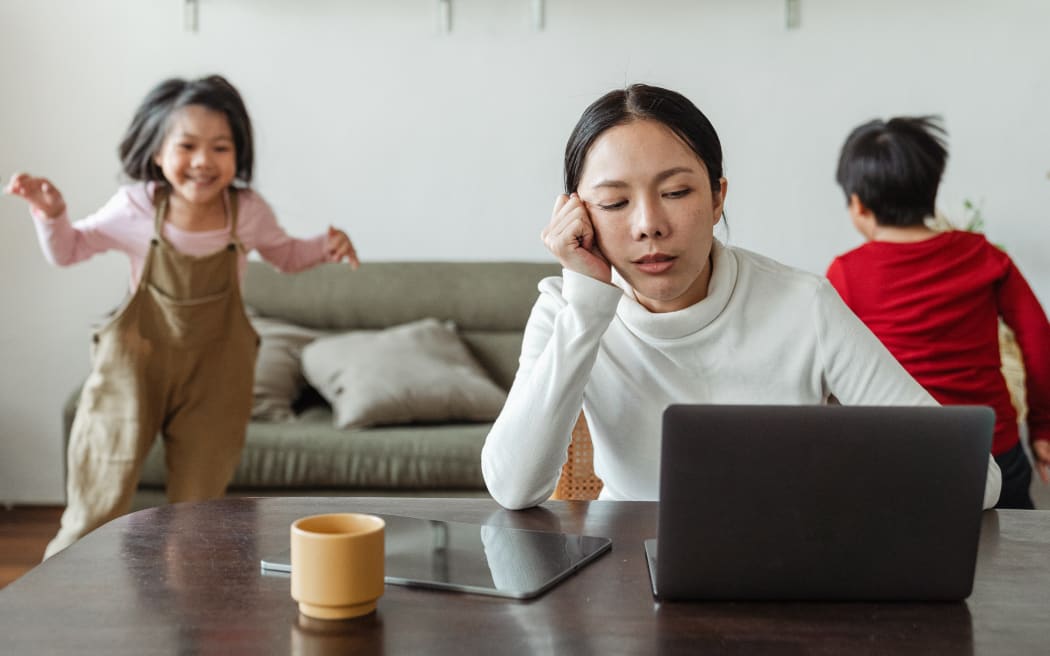What are parents or caregivers to do when there's not much left in the tank?
Not being too hard on yourself is a good start, says clinical psychologist Karen Nimmo.

Photo: Ketut Subiyanto / Unsplash
Parental exhaustion has been around from the beginning of time but ramped up since Covid, Nimmo tells Nine to Noon.
“The three years of that and working from home and all the weather events and the endless disruptions to school... the unsettled world, you're seeing more and more people coming in [to therapists] describing symptoms of burnout.”
Looking after children is a relentless business, she says.
“When you have kids, everybody tells you how much you're going to love them. No one really prepares you for how much you're going to worry about them.”
And that worry doesn’t ever really abate.
“I once naively hoped it would end when they turned 18. It does not.
“My kids are adults now and your heart still races every time you get one of those phone calls. So it's a long gig.”
There is a mass of information, on how to be a better parent, Nimmo says, but little about how to look after ourselves.
“I've looked into the eyes of many, many distressed parents over the years and I really feel for them because it is so hard so long and often so lonely, and people who are doing it on their own or credit to them because it's a tough, tough job.”
If you're burnt out at work you have some options, but with caring for children it’s somewhat different, Nimmo says.
Remember, even if you’re feeling frazzled and disconnected, you are probably still doing a good job.
“The first thing to know is if you are really struggling, it doesn't mean that you are a dreadful parent.”
To raise well-adjusted kids, research suggests you only have to be a good parent 30 percent of the time, she says.
“About a third of the time we're perfectly in tune with our kids and doing well, a third of the time we're trying still trying to figure them out and a third of the time we don't have a clue.”
Keep that ratio in mind, and as long as your children are safe physically and emotionally, you’re doing fine, Nimmo says.
If you feel like you're not doing fine as a parent, it's okay to occasionally mention to your children that you’re having a tough time.
“I think it's fine to let your kids know that you're going through some emotional difficulties ... as long as it's not constant. Kids should not have to be your rock.”
Expressing genuine emotions to your children teaches them that difficult feelings are OK, she says.
“If they're young kids, you can ask them for suggestions about how you could get a break.
“If they're older kids. It's good to ask them to help you in specific ways.”
It is vital to cut yourself some time and space and minimise any guilt, Nimmo says.
“You can start by dialling back your expectations. For example, with kids’ activities, give yourself permission to do as little as possible. And also to not offer them as many opportunities as you might like to.
“When kids show up as adults in therapy, they never think about how many cool activities they did, they never talk about what holidays they had. They don't care how many dinner parties mum and dad had.
“They only remember the vibe in the house, who they got on with and who showed an interest in them.”
When you’re feeling mentally exhausted it's time to look after the body, she says.
“Putting some focus back on your own physical health is a really useful first step.”
These mental and physical building blocks can help you recover some energy, she says.
“Try not to beat yourself up if you're feeling like you're failing because life is long and there will be some good times ahead as a parent – they do come.”

